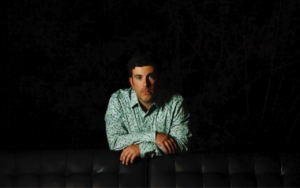 I’ve always been drawn to the music of previous eras.
I’ve always been drawn to the music of previous eras.
As a kid, I loved going through my parents’ vinyl and putting on some dusty record from the stack I’d never heard before.
When I was a teenager I noticed their collection of cool old records had a cutoff point. Sometime in their late-20s they’d apparently stopped buying what I considered to be ‘still relevant’ records.
Their vinyl purchases after that point had been… suspect (in the eyes of a teenaged know-it-all).
Then I’d be blasting something raucous from the 70’s or 80’s in my room, and my mom would ask me to turn it down. “But mommmmm,” I’d whine, “This should be YOUR music! Why don’t you know _____ (any number of bands who I’d assumed were ubiquitous when my parents were in their 20s and 30s)?”
“We had you,” she said.
It seemed unforgivable. No excuses for listening to bland music!
Now a few years into parenthood myself, I GET IT. Gone are the endless hours of musical investigation. The easiest thing (maybe even the natural thing) would be to let your tastes settle, and just kinda cozily listen to the same old stuff for the rest of your life.
But this musical settling isn’t an experience unique to parenthood (though it seems to happen a few years earlier, on average, with parents).
According to Ajay Kalia’s article “Music was better back then: When do we stop keeping up with popular music?” the average listener goes through “taste freeze” in their mid-30s. Using data from Spotify and Echo Nest, Ajay takes a look at how listening habits change with age, what factors influence or precipitate those changes, and how this “maturing” of taste is accelerated in parents.


It’s a really fascinating read and provides some convincing evidence for its argument. That being said, I have a few small problems with the article.
One, its baseline for relevancy is set as mainstream music, who’s popularity is driven by the teen market, and seems to suggest that the less mainstream music you listen to, the less “cool” you are — at least in terms of plotting you out on a graph. In my mind though, “cool” and “relevant” are usually dictated by 20-somethings whose tastes have matured beyond teen/mainstream music, but haven’t yet hit that dreaded “taste freeze.” Am I alone in that assumption?
Also, if “cool” is determined by how much mainstream FM pop music you listen to, well parenthood has actually done wonders for me! Because it’s sometimes easier to just turn the radio on in the car (rather than reach down and plug my phone into the aux-in and find a good Spotify playlist — oh, so exhausting), I’m more in-tune with mainstream (top 40) music today than I have been since I was probably 18 years old. But this doesn’t make me feel cool. It makes me feel lazy.
Lastly, the article doesn’t account much for the fact that this moving away from the mainstream could be a continued “maturing” towards more niche genres and artists — not capitulation. Just because you stopped listening to Taylor Swift doesn’t mean you stopped listening to new music. In fact, when you consider how tightly regulated and limited the playlists of mainstream radio are, you might be able to make the argument that TEENS are the ones with taste freeze, which is usually broken as they move into their 20s and start to define their tastes for themselves. I know some people in their 40s, 50s, 60s, and 70s who listen to tons of new music. They’re exploring, not simply spooning up the slop of pop music du jour.
Anyway, those are my anecdotal counter-arguments. I believe the author that the data speaks for itself in many cases. Lots of people probably do age-out of the active music discovery process. I just wanted to make those few points in defense of music fans that keep up the good fight well into their golden (but not golden oldie) years.
What do you think? Have you experienced taste freeze? Are you judgy towards those who have? Let me know in the comments below.
[hana-code-insert name=’newsletter-free-updates’ /]
